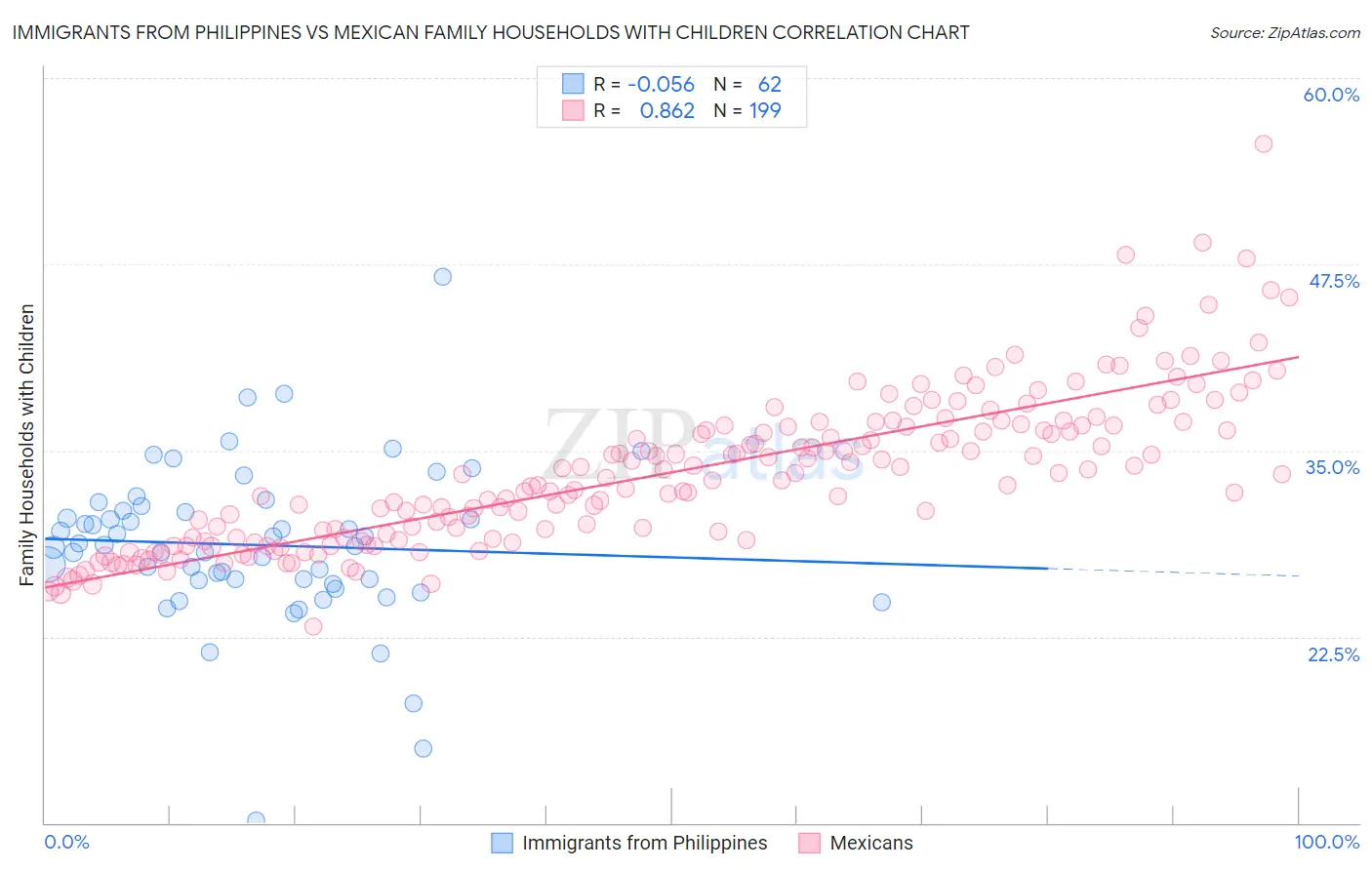Immigrants from Philippines vs Mexican Family Households with Children
COMPARE
Immigrants from Philippines
Mexican
Family Households with Children
Family Households with Children Comparison
Immigrants from Philippines
Mexicans
29.0%
FAMILY HOUSEHOLDS WITH CHILDREN
100.0/ 100
METRIC RATING
46th/ 347
METRIC RANK
31.4%
FAMILY HOUSEHOLDS WITH CHILDREN
100.0/ 100
METRIC RATING
4th/ 347
METRIC RANK
Immigrants from Philippines vs Mexican Family Households with Children Correlation Chart
The statistical analysis conducted on geographies consisting of 470,847,260 people shows a slight negative correlation between the proportion of Immigrants from Philippines and percentage of family households with children in the United States with a correlation coefficient (R) of -0.056 and weighted average of 29.0%. Similarly, the statistical analysis conducted on geographies consisting of 564,219,663 people shows a very strong positive correlation between the proportion of Mexicans and percentage of family households with children in the United States with a correlation coefficient (R) of 0.862 and weighted average of 31.4%, a difference of 8.2%.

Family Households with Children Correlation Summary
| Measurement | Immigrants from Philippines | Mexican |
| Minimum | 10.2% | 23.2% |
| Maximum | 46.7% | 55.6% |
| Range | 36.5% | 32.5% |
| Mean | 28.7% | 33.5% |
| Median | 28.6% | 33.1% |
| Interquartile 25% (IQ1) | 26.3% | 29.1% |
| Interquartile 75% (IQ3) | 31.0% | 36.6% |
| Interquartile Range (IQR) | 4.7% | 7.6% |
| Standard Deviation (Sample) | 5.4% | 5.2% |
| Standard Deviation (Population) | 5.4% | 5.2% |
Similar Demographics by Family Households with Children
Demographics Similar to Immigrants from Philippines by Family Households with Children
In terms of family households with children, the demographic groups most similar to Immigrants from Philippines are Peruvian (29.0%, a difference of 0.010%), Apache (29.0%, a difference of 0.040%), Fijian (29.0%, a difference of 0.090%), Jordanian (29.0%, a difference of 0.13%), and Immigrants from Taiwan (29.0%, a difference of 0.14%).
| Demographics | Rating | Rank | Family Households with Children |
| Yaqui | 100.0 /100 | #39 | Exceptional 29.1% |
| Central Americans | 100.0 /100 | #40 | Exceptional 29.1% |
| Immigrants | South Eastern Asia | 100.0 /100 | #41 | Exceptional 29.1% |
| Spanish American Indians | 100.0 /100 | #42 | Exceptional 29.1% |
| Asians | 100.0 /100 | #43 | Exceptional 29.1% |
| Immigrants | Taiwan | 100.0 /100 | #44 | Exceptional 29.0% |
| Fijians | 100.0 /100 | #45 | Exceptional 29.0% |
| Immigrants | Philippines | 100.0 /100 | #46 | Exceptional 29.0% |
| Peruvians | 100.0 /100 | #47 | Exceptional 29.0% |
| Apache | 100.0 /100 | #48 | Exceptional 29.0% |
| Jordanians | 100.0 /100 | #49 | Exceptional 29.0% |
| Immigrants | Immigrants | 100.0 /100 | #50 | Exceptional 28.9% |
| Immigrants | Peru | 100.0 /100 | #51 | Exceptional 28.9% |
| Guatemalans | 100.0 /100 | #52 | Exceptional 28.9% |
| Immigrants | Cambodia | 100.0 /100 | #53 | Exceptional 28.9% |
Demographics Similar to Mexicans by Family Households with Children
In terms of family households with children, the demographic groups most similar to Mexicans are Tongan (31.2%, a difference of 0.41%), Immigrants from Mexico (31.6%, a difference of 0.78%), Immigrants from India (31.0%, a difference of 1.0%), Immigrants from Central America (31.0%, a difference of 1.3%), and Yakama (30.8%, a difference of 1.9%).
| Demographics | Rating | Rank | Family Households with Children |
| Yup'ik | 100 /100 | #1 | Exceptional 37.0% |
| Inupiat | 100 /100 | #2 | Exceptional 32.8% |
| Immigrants | Mexico | 100.0 /100 | #3 | Exceptional 31.6% |
| Mexicans | 100.0 /100 | #4 | Exceptional 31.4% |
| Tongans | 100.0 /100 | #5 | Exceptional 31.2% |
| Immigrants | India | 100.0 /100 | #6 | Exceptional 31.0% |
| Immigrants | Central America | 100.0 /100 | #7 | Exceptional 31.0% |
| Yakama | 100.0 /100 | #8 | Exceptional 30.8% |
| Thais | 100.0 /100 | #9 | Exceptional 30.6% |
| Immigrants | Fiji | 100.0 /100 | #10 | Exceptional 30.5% |
| Nepalese | 100.0 /100 | #11 | Exceptional 30.5% |
| Immigrants | Pakistan | 100.0 /100 | #12 | Exceptional 30.2% |
| Afghans | 100.0 /100 | #13 | Exceptional 30.2% |
| Bangladeshis | 100.0 /100 | #14 | Exceptional 30.1% |
| Immigrants | South Central Asia | 100.0 /100 | #15 | Exceptional 30.0% |